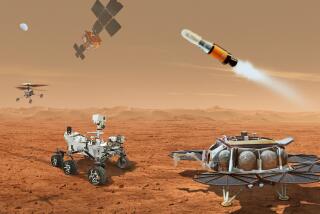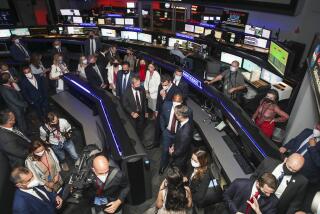Mars Curiosity gets final message from engineers
Engineers have sent their final command to Curiosity, which is less than 13,000 miles from Mars and closing in fast.
Al Chen, an engineer on Curiosity’s entry, descent and landing team, said from inside mission control that a transmitter that had been sending commands to the spacecraft during its long journey to Mars had been turned off as planned at 9:11 p.m. PDT, a little more than an hour before landing. Engineers at the Jet Propulsion Laboratory in La Cañada Flintridge, Chen said, “will no longer be sending any commands.”
Curiosity, he said, “is on her own.”
PHOTOS: History of Mars exploration“She just telling us what’s going on,” he said.
Curiosity was so close to Mars by 9:18 p.m. that it was inside the orbit of one of the planet’s two moons, Deimos.
“Tonight’s it – the Super Bowl of planetary exploration,” said Doug McCuistion, director of NASA’s Mars Exploration Program. “We score and we win – or we don’t score and we don’t win.”
PHOTOS: Preparing for Martian landing“If we succeed, it will be one of the greatest feats in planetary exploration – ever,” McCuistion said. “The science at Mars is crucial to key questions in science: Are we alone?”
Curiosity is the size of a small car and is the largest and most advanced machine scientists have ever attempted to send to another planet. The robot is a roving geochemistry laboratory, equipped with a suite of powerful instruments and capable of vaporizing rocks and ingesting Martian soil.
If it succeeds, the mission is expected to revolutionize scientists’ understanding of Mars by scouring an ancient meteor crater and a mountain for the building blocks of life in an effort to determine whether the planet is or was habitable.
INTERACTIVE: Curiosity, from liftoff to landingThe craft is also expected to pave the way for important next steps in deep-space exploration, including sample return and potential human exploration. President Obama has established a goal of sending astronauts to Mars in the 2030s. One day, NASA Associate Adminstrator John Grunsfeld said Sunday afternoon, humans could even live on Mars.
Earlier Sunday, two top space officials pledged to continue the exploration of Mars in years to come – regardless of whether NASA’s Curiosity rover survives its dramatic landing later tonight.
“We are committed to a Mars exploration program,” Grunsfeld said.
Grunsfeld appeared at a news briefing with Charles Elachi, the director of the Jet Propulsion Laboratory in La Cañada Flintridge, which is managing the $2.5-billion Curiosity mission.
Elachi said that in the final hours of Curiosity’s flight, he had turned to the words of Teddy Roosevelt: “Far better it is to dare mighty things, to win glorious triumphs, even though checkered by failure, than to take rank with those poor spirits who neither enjoy much nor suffer much, because they live in the gray twilight that knows neither victory nor defeat.”
“This is a message to the whole world: We are to dare mighty things, even if we might fail,” Elachi said. “Every explorer has had tough days. It was never easy.”
Related:
It’s a tense confidence, ex-NASA official says
Mars exploration to go on even if mission fails







